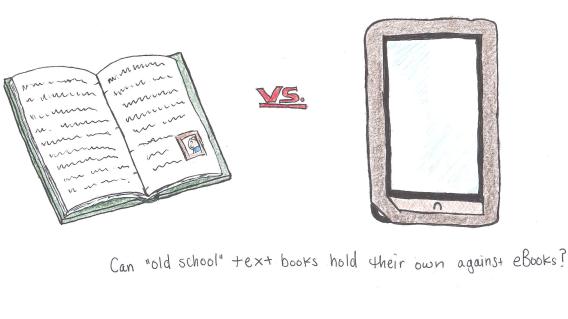
Online vs. print textbooks: who decides
November 7, 2013
Prominent astronomer and author Carl Sagan once said, “We’ve arranged a civilization in which most crucial elements profoundly depend on science and technology.”
Despite the fact that the world is becoming more technologically dependent, this does not mean that eBooks are better mediums for academics.
Research gained from a study conducted by Kate Garland reveals that students may be at a disadvantage when studying complex material through electronics, rather than textbooks.
According to Garland, a lecturer at the University of Leicester in England, students using eBooks have to repeat the information more times than traditional textbooks to receive the same amount of retention of material.
The use of online textbooks in and out of schools may be harming students’ memories of the material as well as increasing eyestrain. Furthermore, online textbooks are inconvenient and unfair to families without Internet access at home or a personal device, such as a computer. Edudemic.com states that 98% of students are said to own a digital device. However, this statistic does not differentiate between cell phones, smart phones, and computers and a large portion of students find it inconvenient to access material on a cellular device.
Also, online textbooks limit the students’ ability to take notes and see them on the page next to the words, which is a commonly used study habit for many students. The same study by Garland says that scrolling on online textbooks can be more of a distraction to the reader than turning pages. Online textbooks remove the ability to find physical reference points allowed by traditional textbooks.
On the other hand, eBooks are a valuable resource to students who cannot afford or do not want to pay extravagant sums for physical textbooks. Online textbooks are more portable than the heavy “old school” textbooks and cut down on the amount of paper, making them much more environmentally friendly. They also offer the option of interactive activities and online tutorials, as well as faster searching.
However, if online textbooks are hindering students’ learning, the negatives far outweighs the positives.
To solve this issue, both traditional and online textbooks should be made available to fit the students’ preference. This alternative would solve the problem of students who do not have Internet access at home or the time to access a device, benefiting teachers and students alike.
The controversy regarding the usefulness and convenience is ongoing in schools across the nation. Concerns over online textbook availability to students and dissatisfaction with hindered information retention can be easily fixed by issuing students a physical textbook, as well as offering the opportunity to access an online textbook.